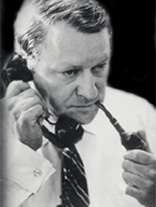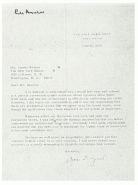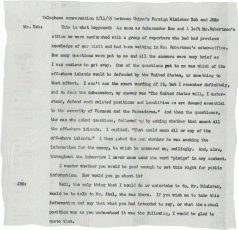


A Distinguished Legacy
James Barrett Reston (1909-1995), born in Scotland, raised in Ohio, educated in Illinois, spent most of his life in the nation's capital. It was there, in the period between the end of World War II and the end of the war in Vietnam, that he became the preeminent journalist of his generation. The place and time were important to Reston's influence and success. His career roughly coincided with the Cold War, when decisions made in Washington were central to the very survival of the United States of America. Those who reported and interpreted the news were thus the critical link between the government and the governed during the most dangerous period of American history since the Civil War.
It was not, however, mere historical accident that made Reston so important to his profession and to the nation. By experience, nature, and intellect, Reston became a master at prying loose from government officials the information they wanted to keep secret. He understood the problems and the policy options and thus could anticipate the decisions leaders would make. He created a bond of personal trust that made confiding in him easy and natural for those in power. He was a kind of outside-insider, becoming a channel through which the government spoke to the country, and in the vast and contentious bureaucracy of Washington, a way for one part of the government to speak to other parts of the same government.
As Reston moved from being a news reporter to the role of columnist and commentator, his natural sense of fairness and balance made his voice a beacon of moderation and good sense. His political bent was toward the progressive, but he was firmly rooted in the practical, the doable. He was not a philosopher of government, like his mentor Walter Lippmann. Rather, he was the barometer of the political center, an explicator of the events and the people he witnessed. He understood Washington and had an abiding sympathy for the burdens of public office. He also had a sharp eye that saw through self-promoters, deflated the pompous, and unmasked the charlatans. Because his column was syndicated in hundreds of American news- papers, he was a national and unifying voice.

University Archives, University of Illinois at Urbana-Champaign




